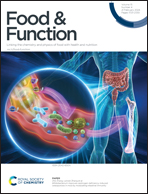Effects of the ApoE genotype on cognitive function in aging mice fed with a high-fat diet and the protective potential of n-3 polyunsaturated fatty acids†
Abstract
The ApoE4 allele is the strongest genetic determinant for Alzheimer's disease (AD), while obesity is a strong environmental risk for AD. The modulatory effect of the ApoE genotype on aging-related cognitive function in tandem with a high-fat diet (HFD) remains uncertain. This study aimed to elucidate the effects of ApoE3/ApoE4 genotypes in aged mice exposed to a HFD, and the benefits of n-3 polyunsaturated fatty acids (PUFAs) from fish oil. Remarkably, the HFD led to weight gain and lipid accumulation, more pronounced in ApoE3 mice, while ApoE4 mice experienced exacerbated cerebral insulin resistance, neuroinflammation, and oxidative stress. Critically, n-3 PUFAs modulated the cerebral insulin signaling via the IRS-1/AKT/GLUT4 pathway, mitigated microglial hyperactivity, and reduced IL-6 and MDA levels, thereby counteracting cognitive deficits. These findings highlight the contrasting impacts of ApoE genotypes on aging mice exposed to a HFD, supporting n-3 PUFAs as a strategic nutritional intervention for brain health, especially for ApoE4 carriers.



 Please wait while we load your content...
Please wait while we load your content...